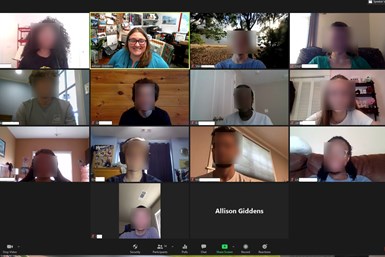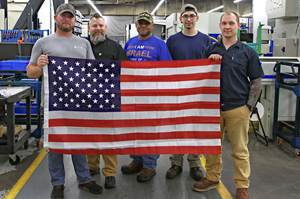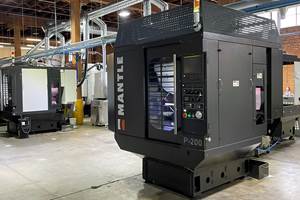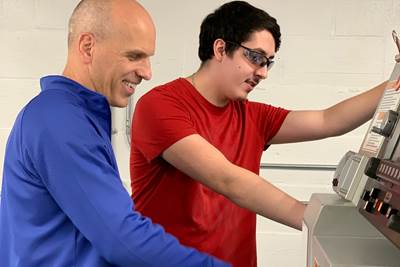Exploring Virtual Internships in Manufacturing
Allison Giddens of Win-Tech Inc. describes how she turned Win-Tech’s high school internship from COVID cancellation to virtual success.
Share


Takumi USA
Featured Content
View More



Autodesk, Inc.
Featured Content
View More


I had finally figured out how to host high school interns when COVID-19 had other plans.
Win-Tech Inc., an aerospace machine shop located in Kennesaw, Georgia, has remained open during the pandemic, but we limit visitors to those necessary to the business. Unfortunately, interns did not qualify as “necessary.”
I spent several days dreading the internship cancelation conversation with the teacher, but the world has a funny way of working.
The same afternoon I sat down to email my contact, I received an email from another friend in the educational world asking if I had decided to take on any interns for the summer since so many school plans were falling apart.
I hate saying “no,” so I said, “yes, BUT,” and proposed a virtual concept I developed on the fly.
Over the next two weeks, I developed a four-week Advanced Manufacturing Virtual Internship. I had a website, criteria for participation and an online application. In no time, 12 high school seniors from four local schools signed up, ready to go. The students spanned the spectrum — some had taken a physics class or two, some were actively engaged in STEM activities, some were members of their school’s robotics teams and some envisioned themselves one day becoming an engineer.
The interns and I “met” on Zoom for 15 days, mid-day for an hour.
Each day I gave a high-level overview of a different concept ranging from engineering design to risk management to supply chain to marketing. My intent was to provide students with insight into many different facets of the industry. I wanted to get them excited about something they had not yet thought of or add fuel to an existing passion.
Conversations were real and practical.
We talked about systems-thinking and key performance indicators (KPIs). We spent one class pretending we owned a manufacturing company and made decisions about the risks a business owner encounters along the way. Conversations were real and practical.
A student-accessible website housed several existing resources I pulled together to allow students to go down the rabbit hole when they found something of interest beyond the scope of the hour-long discussions.
The most valuable part of the inaugural program was the group of enthusiastic colleagues who agreed to take part. I reached out to friends in the industry and they happily served as guest speakers, telling their stories, talking about their companies and answering questions.
These were subject matter experts from Manchester, UK, and all over the United States: Colorado, California, Pennsylvania, New Hampshire, Tennessee and many other manufacturing hubs. Their roles ranged from business owners and engineers to service technicians and welders. Students knew in advance who was coming to speak so they could be prepared to ask relevant questions.
Busy professionals asked to come back and devote more time to teaching high school students about their areas of expertise.
Not only were these busy professionals devoting time to prepare a presentation and then spending 30-60 minutes with a group of 12 high school students on Zoom, but many asked to come back to devote more time, money and resources to students they had never met in person.
To wrap up the program, teachers and parents were invited to call in during the last two days. During these two days, students presented on a topic of their choice before a panel of judges. They were asked to research or solve a problem using an engineering or manufacturing concept. Students talked about aerospace innovation, ethics of artificial intelligence in the supply chain, additive manufacturing, a game plan to create demand for hydrogen-use efficiencies and so much more. The judges scored the students and declared winners based on several categories.
What better way to highlight your Pandemic Summer as a high school student than to say you engaged in an Advanced Manufacturing Virtual Internship and won an award for a project you put your heart and soul into?
The success of the inaugural internship class led me to start working with another organization to create a version of the internship for neurodiverse young adults.
These first students never ceased to amaze me throughout the program. I was impressed with their professionalism, their critical thinking skills and their genuine curiosity. They asked questions that were one step ahead of where I assumed they would be. These young adults are going to do wonderful things and I cannot wait to see them do it.
About the Author
Allison Giddens
President at Win-Tech, Inc. and a perpetual learner with degrees and certifications in Psychology, Criminal Justice, Manufacturing Engineering, Conflict Management, Event Planning, Cybersecurity Risk Management, and Comedy Linguistics.
Related Content
Finding Skilled Labor Through Partnerships and Benefits
To combat the skilled labor shortage, this Top Shops honoree turned to partnerships and unique benefits to attract talented workers.
Read MoreIn Moldmaking, Mantle Process Addresses Lead Time and Talent Pool
A new process delivered through what looks like a standard machining center promises to streamline machining of injection mold cores and cavities and even answer the declining availability of toolmakers.
Read MoreThe Power of Practical Demonstrations and Projects
Practical work has served Bridgerland Technical College both in preparing its current students for manufacturing jobs and in appealing to new generations of potential machinists.
Read MoreFinding the Right Tools for a Turning Shop
Xcelicut is a startup shop that has grown thanks to the right machines, cutting tools, grants and other resources.
Read MoreRead Next
Managing Generation Z in Manufacturing
The next generation of manufacturing employees have a solid work ethic and vast technical skills that provide value in the machine shop.
Read More





































.jpg;maxWidth=300;quality=90)





